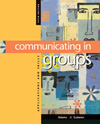Critical Thinking about Internet Sources This chapter has stressed the importance of critical thinking. When using the
Internet for information, group members have an ethical responsilibity to ensure
that evidence and information are accurate and effective. Bourhis, Adams, Titsworth,
and Harter recommend using the following criteria to critically evaluate Web
sources: 1. Is the supporting material clear? Sources should help you add clarity
to your ideas rather than confusing the issue with jargon and overly technical
explanations. 2. Is the supporting material verifiable? You should be able to independently
verify facts and details contained on a Web page. 3. Is the source of supporting material competent? You should determine
the source of the Web material and determine whether or not the source is qualified. 4. Is the source objectice? All sources--even news reports--have some
bias. Your responsiblity is to ensure that your sources minimize bias. 5. Is the supporting material relevant? Using irrelevant research may
make your ideas appear well supported; however, critical listeners will see
through this tactic. Only utilize sources that directly address the key points
you want to make. You should also consult the following sources to find more information on evaluating
the quality of Web information: http://www.virtualsalt.com/evalu8it.htm http://www.ithaca.edu/library/Training/hott.html SOURCE: J. Bourhis, C. Adams, S. Titsworth, and L. Harter, Style Manual for
Communication Studies (New York: McGraw-Hill, 2002). | 


 2003 McGraw-Hill Higher Education
2003 McGraw-Hill Higher Education